

Diana *** Diana (Greek Counterpart was Artemis)The Romans habitually assimilated various elements from other cultures and civilisations, including the gods and goddesses that were worshipped by the Greeks and other nations.
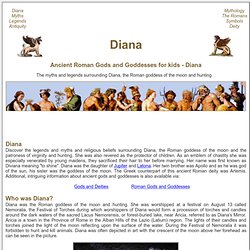
Diana. The Roman Goddess DianaThe way of the Romans was to adopt various elements from other cultures and civilisations.
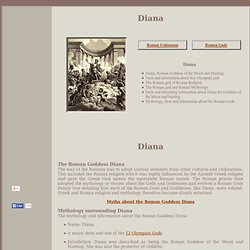
This included the Roman religion which was highly influenced by the Ancient Greek religion and gave the Greek God names the equivalent Roman names. Myths about the Roman Goddess Diana. Myths about the Roman Goddess DianaThe content of this 'Myths about the Roman Goddess Diana article provides interesting information about the legends and stories from Roman mythology about this famous Roman Goddess.
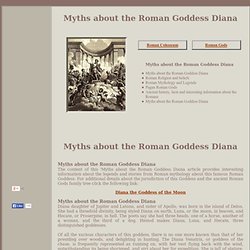
For additional details about the jurisdiction of this Goddess and the ancient Roman Gods family tree click the following link: Diana the Goddess of the Moon Myths about the Roman Goddess DianaDiana daughter of Jupiter and Latona, and sister of Apollo, was born in the island of Delos. She had a threefold divinity, being styled Diana on earth, Luna, or the moon, in heaven, and Hecate, or Proserpine, in hell.
The poets say she had three heads, one of a horse, another of a woman, and the third of a dog. Diana. Witches Of The Craft. Roman Goddess Diana. Areas of Influence: Diana was the Goddess of the hunt and wild animals.
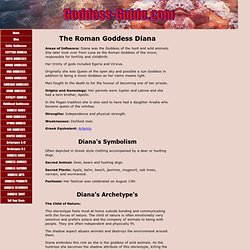
She later took over from Luna as the Roman Goddess of the moon, responsible for fertility and childbirth. Her trinity of gods included Egeria and Virvius. Originally she was Queen of the open sky and possible a sun Goddess in addition to being a moon Goddess as her name means light. Men fought to the death to for the honour of becoming one of her priests. Origins and Genealogy: Her parents were Jupiter and Latona and she had a twin brother, Apollo. In the Pagan tradition she is also said to have had a daughter Aradia who became queen of the witches. Strengths: Independence and physical strength. Weaknesses: Disliked men. Greek Equivalent: Artemis Diana's Symbolism Often depicted in Greek style clothing accompanied by a deer or hunting dogs.
Sacred Animal: Deer, bears and hunting dogs. Sacred Plants: Apple, balm, beech, jasmine, mugwort, oak trees, vervain, and wormwood. Festivals: Her festival was celebrated on August 13th. Diana - Who Was the Goddess Diana? Many Pagans honor the goddess Diana in her various aspects.
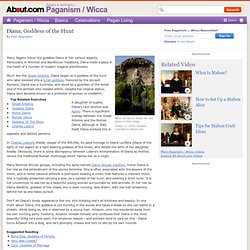
Goddess Diana. Diana is the Roman Goddess of the woodlands, wild animals and of the hunt.
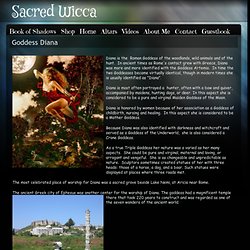
In ancient times as Rome's contact grew with Greece, Diana was more and more identified with the Goddess Artemis. In time the two Goddesses became virtually identical, though in modern times she is usually identified as "Diana". Diana is most often portrayed a hunter, often with a bow and quiver, accompanied by maidens, hunting dogs, or deer. In this aspect she is considered to be a pure and virginal Maiden Goddess of the Moon. Diana is honored by women because of her association as a Goddess of childbirth, nursing and healing.
Because Diana was also identified with darkness and witchcraft and served as a Goddess of the Underworld, she is also considered a Crone Goddess. As a true Triple Goddess her nature was a varied as her many aspects. The most celebrated place of worship for Diana was a sacred grove beside Lake Nemi, at Aricia near Rome. Diana - Goddess Of The Hunt - The Goddess. Diana (mythology) Diana (pronounced with long 'ī' and 'ā') is an adjectival form developed from an ancient *divios, corresponding to later 'divus', 'dius', as in Dius Fidius, Dea Dia and in the neuter form dium meaning the sky.[2] It is rooted in Indoeuropean *d(e)y(e)w, meaning bright sky or daylight, from which also derived the name of Vedic god Dyaus and the Latin deus, (god), dies, (day, daylight), and " diurnal", (daytime).
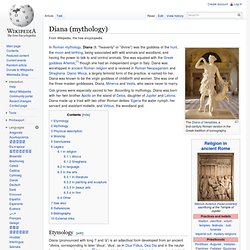
On the Tablets of Pylos a theonym διϝια (diwia) is supposed as referring to a deity precursor of Artemis. Modern scholars mostly accept the identification.[3][need quotation to verify] The ancient Latin writers Varro and Cicero considered the etymology of Dīāna as allied to that of dies and connected to the shine of the Moon. The persona of Diana is complex and contains a number of archaic features. According to Georges Dumézil[4] it falls into a particular subset of celestial gods, referred to in histories of religion as frame gods. F.